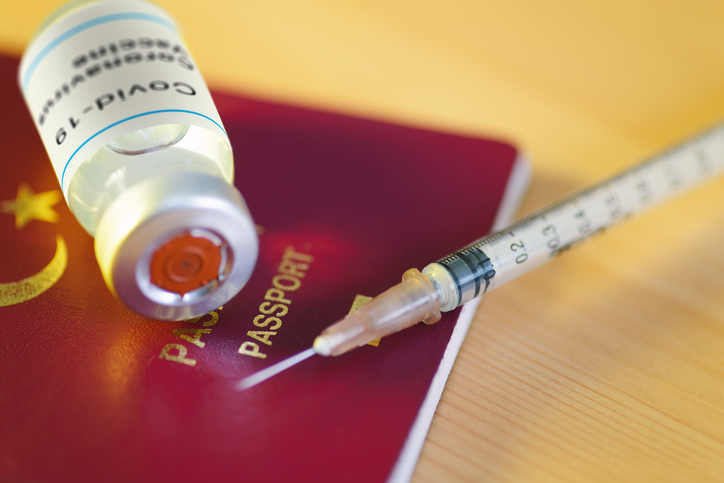Multiple companies and technology groups are developing apps and systems for implementing vaccine passports to help track and manage COVID-19 results and the vaccination process.
Vaccine passports, also known as health passports or immunity passports, are a form of digital identification showing proof of COVID-19 vaccinations or test results. The passports could be required as a condition of entry at airports, baseball games, music venues, and movie theaters. Employers could require them before entering the office.
Goodbye, Spontaneity
Since the beginning, people have speculated about how the COVID-19 pandemic will lead to permanent changes in our economy and culture.
Will we stop shaking hands? Is mask-wearing the new normal? What will live sports and concerts look like in the future? Some of the world’s most powerful figures are calling for a “Great Reset” of cultural and economic norms, using the foundation created by the pandemic lockdowns as a model for the shift.
One thing likely to change after the mass distribution of coronavirus vaccines is that some governments and industries will mandate proof of vaccinations. Last fall, Ticketmaster made headlines for its plan to mandate either vaccination or a negative test as a condition of attending live events. Now, we could be close to seeing a similar system at airports.
Two Passports to Fly
If vaccine passport usage becomes widespread, airline passengers could be required to show both an ID and proof of clean health records before boarding an airplane. According to CNN, “airlines including Cathay Pacific, JetBlue, Lufthansa, Swiss Airlines, United Airlines, and Virgin Atlantic” are already planning for such a system.
The airlines are working with an initiative called the Common Trust Network, which was created by The Commons Project and the World Economic Forum. On the Common Trust Network’s smartphone app, CommonPass, users can upload their COVID-19 test result or proof of vaccination, then receive a QR code to be scanned at the airport. The QR code does not reveal private information to the person scanning it.
The chief medical officer at the Commons Project Foundation, Brad Perkins, M.D., told the New York Times on December 13 that travelers without smart devices would have to print the confirmation code as they would a paper boarding pass.
Users can also open the CommonPass app to view local rules at their departure and arrival locations. The app, which was first tested on an international United Airlines flight in October, seeks verification that the traveler has met the requirements. If not, the app sends the traveler to an approved vaccination or testing facility. Currently, many international destinations require proof of a recent negative COVID-19 test, among other precautions.
A nonprofit called the Linux Foundation is working with IBM, CommonPass, and the COVID-19 Credentials Initiative to develop standards for vaccine credential apps. Brian Behlendorf, executive director of the Linux Foundation, told CNN that he expects these apps to be “widely available” before the first half of 2021 is through.
Letting Markets Decide
So far, there is no indication that the U.S. government will mandate vaccinations to travel, which would be an unprecedented restriction of personal liberty.
Private businesses have the option to require health requirements as part of the contract with their customers. If, however, airlines universally decide to adopt vaccine passports, customers could effectively be forced to get vaccinated to fly.
There is a big distinction between government mandates and business-imposed requirements, says Twila Brase, the president and founder of the Citizens’ Council for Health Freedom and policy advisor to The Heartland Institute, which co-publishes Health Care News.
“If the government imposes vaccines as a condition of travel or conducting business, it directly violates our individual rights under the U.S. Constitution,” Brase told Health Care News.
“A vaccination passport, if created or supported by government action, could lead to the end of vaccine choice and the imposition of government-enforced vaccination mandates.”
Such a prospect would be a dangerous precedent, Brase says.
“On the other hand, if a business imposes such requirements, the individual is free to refuse to participate in the business, taking their choices, their purchases, and their money elsewhere,” Brase said.
Depends on Vaccine Success
Vaccine passports could very well become the norm if airlines believe they need to implement them to stay afloat as the pandemic and lockdowns drag on. That is far from clear, as scientists still do not know if the Pfizer and Moderna vaccines can even prevent transmission. Theoretically, vaccinated airplane passengers can still spread COVID-19 to others, according to the U.S. Centers for Disease Control and Prevention.
Some freedom advocates are open to the idea of vaccine passports. One encouraging report was published in The Lancet in October. The authors, led by Rebecca Brown, Ph.D., who specializes in medical ethics at the University of Oxford, argued that passports would allow people to escape lockdown and engage in contact with others and that it is unjustifiable to violate the civil liberties of people who are immune to infection.
The free market provides an answer for those who disapprove of a business’ actions, Brase says.
“If a company demands you either reveal your health status or submit to vaccination as a prerequisite for service, let the company know your objections,” Brase said. “Do not leave them in the dark.”
Harry Painter (harry@harrypainter.com, @TheHarryPainter) writes from Brooklyn, New York.

